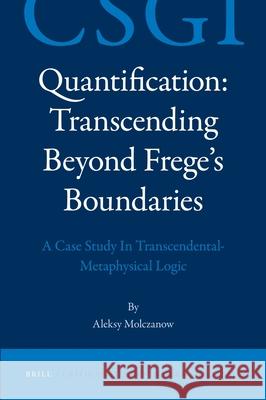Quantification: Transcending Beyond Frege's Boundaries: A Case Study in Transcendental-Metaphysical Logic » książka
Quantification: Transcending Beyond Frege's Boundaries: A Case Study in Transcendental-Metaphysical Logic
ISBN-13: 9789004222694 / Angielski / Twarda / 2012 / 252 str.
Quantification: Transcending Beyond Frege's Boundaries: A Case Study in Transcendental-Metaphysical Logic
ISBN-13: 9789004222694 / Angielski / Twarda / 2012 / 252 str.
(netto: 532,95 VAT: 5%)
Najniższa cena z 30 dni: 539,19
ok. 30 dni roboczych.
Darmowa dostawa!
In his attempt to give an answer to the question of what constitutes real knowledge, Kant steers a middle course between empiricism and rationalism. True knowledge refers to a given empirical reality, but true knowledge has to be understood as necessary as well, and so consequently, must be a priori. Both demands can only be reconciled if synthetic a priori judgments are possible. To ground this possibility, Kant develops his transcendental logic. In Frege's program of providing a logicistic basis for true knowledge the same problem is at issue: his logicist solution places the quantifier into the position of the basic element connected to the truth of a proposition. As the basic element of a theory of logic, it refers at the same time to something in reality. Molczanow argues that Frege's program fails because it does not pay sufficient attention to Kant's transcendental logic. Frege interprets synthetic a priori judgments as ultimately analytic, and thus falls back onto a Leibnizian rationalism, thereby ignoring Kant's middle course. Under the title of the transcendental analytic of quantification Molczanow discusses Frege's concept of quantification. For Frege, the proper analysis of number words and the categories of quantity raises problems which can only be solved, according to Molczanow, with the help of Kant's transcendental logic. Molczanow's book thus deserves its places in the series Critical Studies in German Idealism because it provides a further elaboration of Kant's transcendental logic by bringing it into conversation with contemporary logic. The result is a new conception of the nature of quantification which speaks to our time.











